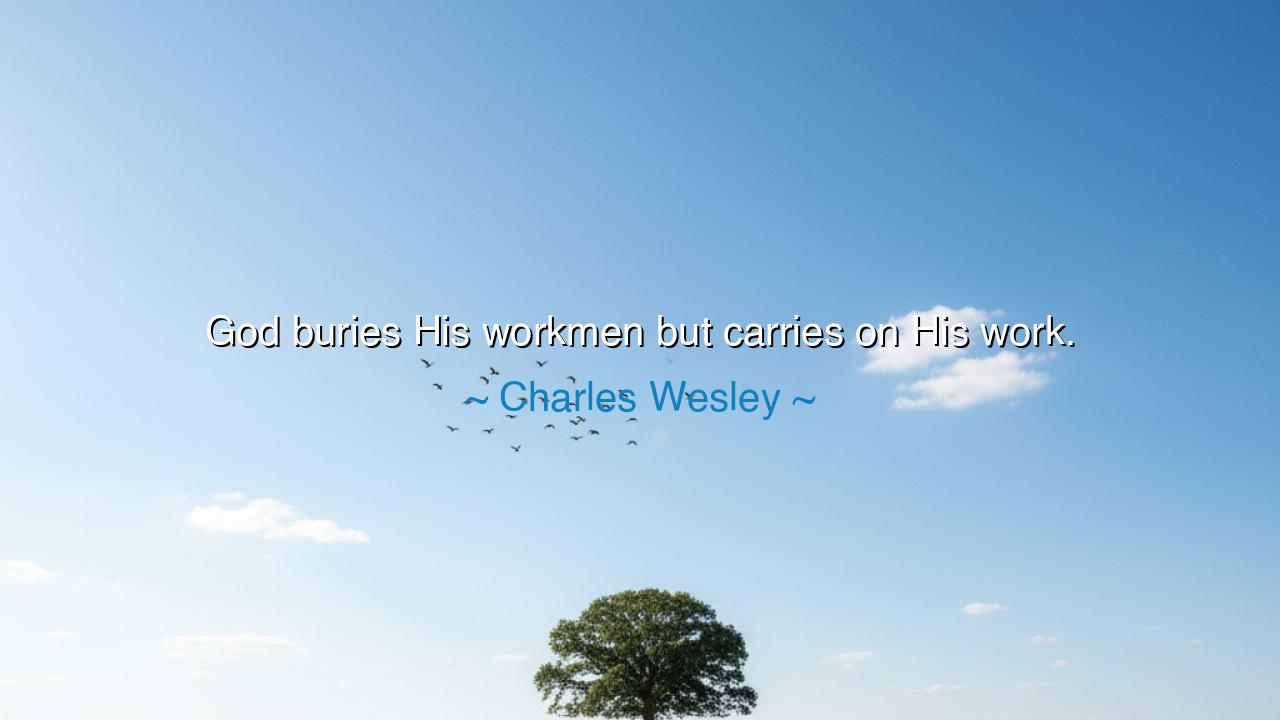
God buries His workmen but carries on His work.






“God buries His workmen but carries on His work.” — Thus spoke Charles Wesley, the poet of faith and brother to John Wesley, founder of Methodism. In this single line, he captured a truth vast as eternity: that though men are mortal, God’s purpose is immortal. The hands of His servants may fall still, the voices that once thundered His message may fade into dust, but the divine work — the work of truth, of mercy, of redemption — flows onward like an unbroken river. For the Creator’s plan is not bound to the span of human life; it is greater than empires, stronger than death, and woven through the generations like light through the dawn.
Charles Wesley lived in an age of awakening — the eighteenth century, when the fires of faith were dimming under the weight of custom and apathy. Alongside his brother John, he journeyed through England’s fields and villages, preaching salvation to the weary and forgotten. They faced ridicule, hardship, and danger; yet their message — that grace cannot die — spread like flame in the dark. And it was from this truth, tested in toil and loss, that Wesley’s words were born. He had seen many faithful laborers fall — preachers, friends, believers — but each time, others rose in their place. The men passed; the mission endured.
The meaning of Wesley’s quote is both humbling and triumphant. It reminds us that the servants of God are but vessels, temporary instruments through which eternal purposes move. A man may be called to plant the seed, another to water it, and yet another to reap the harvest — but the harvest itself belongs to God. When one worker is buried, the work does not perish with him, for the Author of all creation writes His story upon the hearts of those who remain. This is the mystery of divine continuity: that no grave can silence what Heaven has ordained.
History offers countless echoes of this truth. Consider Moses, the great deliverer of Israel. He led his people from bondage, guided them through the wilderness, and beheld the Promised Land from afar — yet he did not enter it. Upon his death, many wept and feared that the mission would die with him. But God raised up Joshua, and the people crossed the Jordan, for the work was never Moses’ alone — it was the Lord’s. So too, when the disciples mourned at the cross, thinking the kingdom lost, they did not yet see that the death of the Master was but the seed of resurrection. God buries His workmen, but carries on His work.
Even in our own time, this truth resounds. When Martin Luther King Jr. fell to an assassin’s bullet, the world mourned the loss of his voice. Yet his dream did not die in Memphis; it breathed anew in the hearts of millions who marched, who voted, who stood for justice. When the work is divine, it cannot be entombed. The man may perish, but the message — if born of truth and righteousness — becomes immortal. Thus, each generation inherits not only the legacy of its heroes, but the unfinished labor of Heaven itself.
Wesley’s words call us, too, to courage and humility. Courage — to take up the tools of those who came before, to continue the work though the path is weary and the world forgetful. Humility — to remember that we are not the masters of the mission, but temporary stewards of an eternal calling. We build upon foundations we did not lay, and others will one day build upon ours. Therefore, let no man despair when he sees his efforts end, nor grow proud when his work prospers, for both are parts of the same divine design.
And so, my children, learn this sacred truth: our duty is to labor faithfully, not eternally. The work is God’s; the time is His choosing. When your days are spent and your strength fails, others will rise to continue what you began. The flame you carry today will light torches you may never see. Live, therefore, not for recognition, but for legacy — not for reward, but for righteousness. Trust that what you build in faith will not perish, for the hand of God sustains what man cannot.
Let Wesley’s wisdom be your comfort and your call: God buries His workmen, but carries on His work. Death may silence the voice, but not the truth it spoke. The field may lose its laborer, but not its harvest. And the faithful heart, though it returns to the dust, becomes the very soil from which new life grows. So labor on, O worker of light — for though you will one day rest, the Work will live forever.






AAdministratorAdministrator
Welcome, honored guests. Please leave a comment, we will respond soon